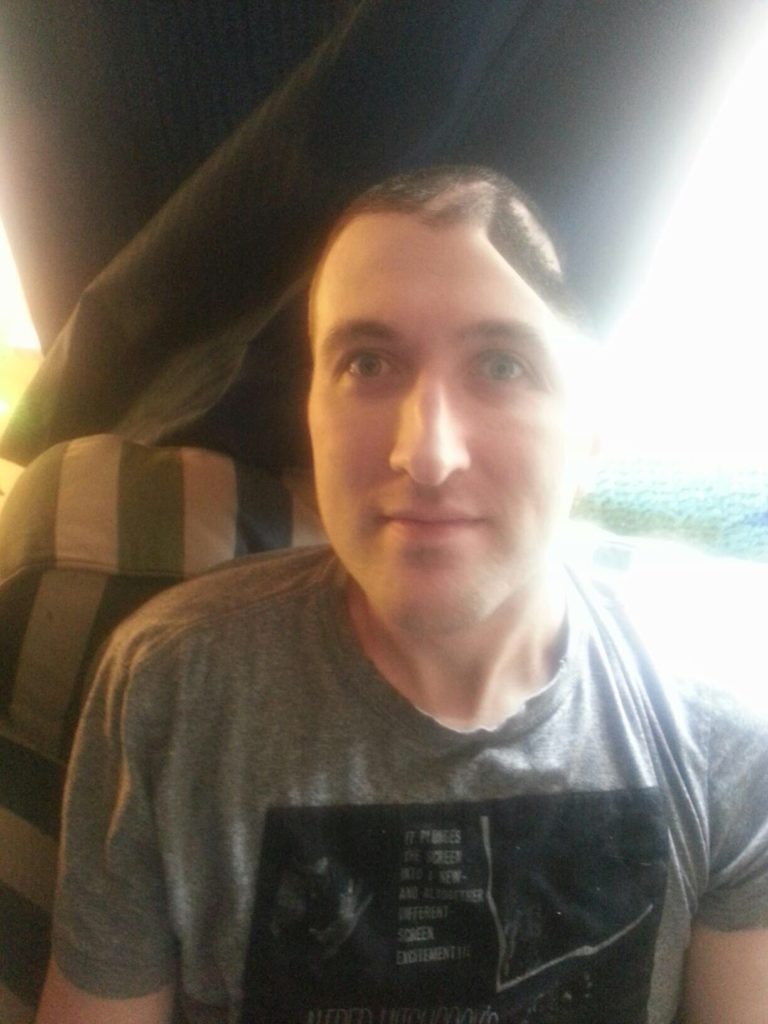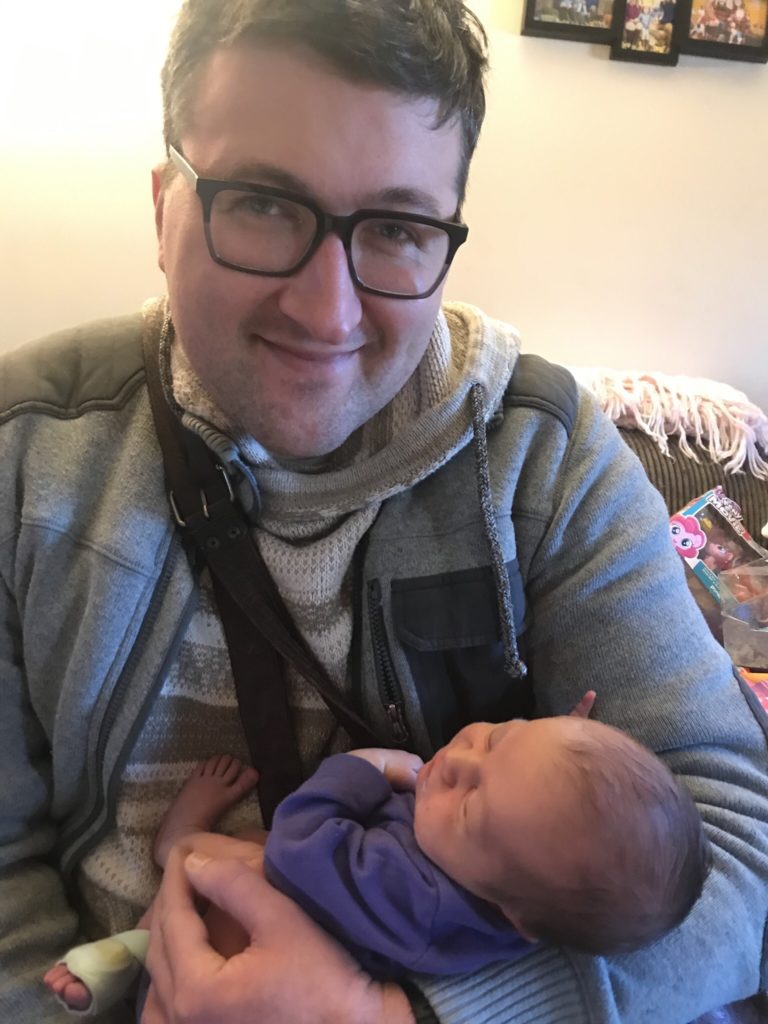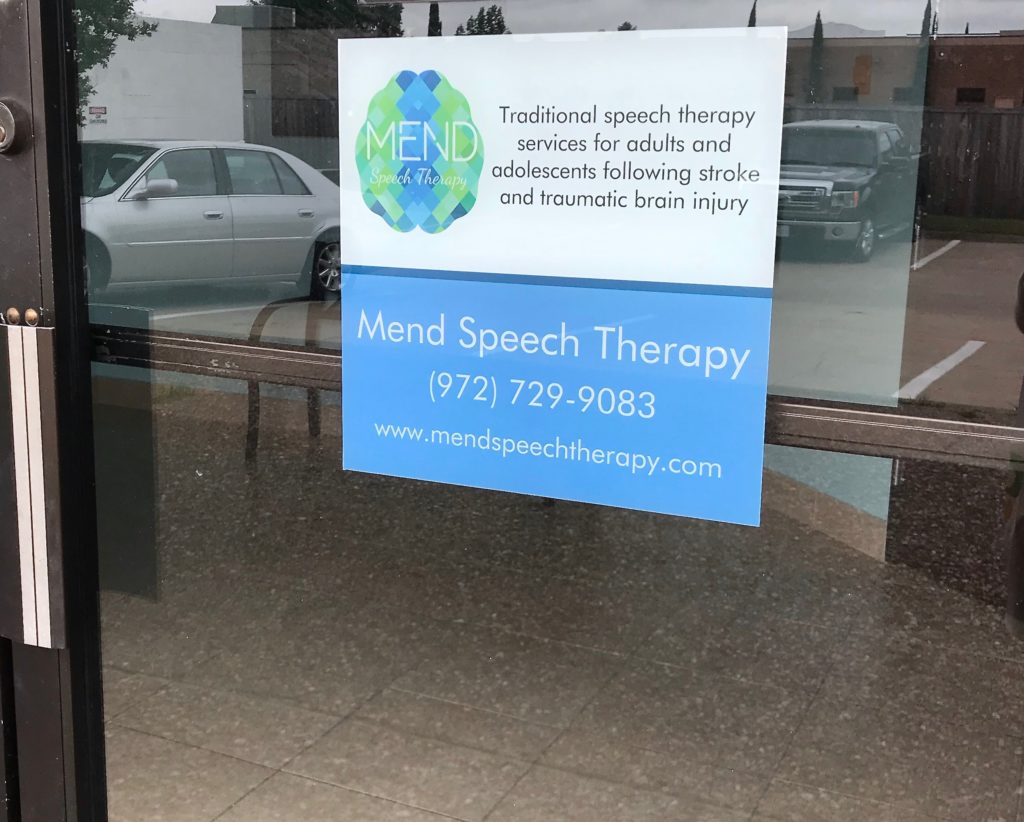Welcome to the Aphasia Threads Project, which weaves together three points-of-view: people with aphasia, caregivers, and the professionals who help each family navigate aphasia. Each week, we bring together three unrelated stories, one from each member of this triad, to learn from their experience. This week, we’ll hear from Michael, a person with aphasia, who had a TBI in 2015. Then, we’ll hear from Eileen, who is a caregiver for her brother who had a stroke. Finally, we’ll hear from Emily, an SLP in Richardson, Texas.

Person with Aphasia
I slipped on a patch of ice in Chicago on February 9, 2015, and suffered a Traumatic Brain Injury. I was rushed to the hospital where they performed an emergency craniotomy because my brain was swelling. I was in a coma for two weeks. After my stay at Illinois Masonic Hospital, I was transferred to the Rehabilitation Institute of Chicago. I underwent rigorous physical, occupational and speech therapy. I had to wear a helmet on my head to protect my healing skull and brain. I wore this until my second craniotomy four months later, because the doctor inserted the piece of my skull under my belly.

Aphasia Changes Your Life
My relationships shifted when I left Chicago. Most of my so-called friends didn’t want to deal with me. I relocated to my hometown after 15 years. I have a few friends here, but one really great friend.

But There Are Things That Help
Assistive Express in an app I downloaded at the Rehabilitation Institute of Chicago. I still use it to this day.
And Things You Learn Along the Way
Mourn the loss of friends quickly. I was a social butterfly, but my true friends stuck by me. Your family is key to your recovery. Hold them close.
What Caregivers and Professionals Can Learn From Me
It’s a struggle every day. But I have the strength to look forward to tomorrow.

Caregiver
My brother had a stroke at the age of 53, ending his teaching career, his football coaching career, and life as he had known it. He lives in a small town upstate and is divorced. I was 54, a writer/bartender living in NYC. During the first few months, I would drive my old 1993 Honda upstate to stay with my brother and help him manage this new way of being in the world. His prognosis was bad – the neurologist said he had a 50/50 chance of regaining speech, and would never live independently again. That has not been the case. Against those odds, he has made a remarkable recovery and lives independently, though he struggles mightily with aphasia.

Aphasia Changes Your Life
I suddenly needed to learn how to be an advocate for my brother – to navigate the medical/insurance system, apply for disability, manage his retirement from teaching, deal with his horrible ex-wife, and try to help him manage his relationship with his children. All while coping with my own depression/shock/sadness over the devastating turn life took. My brother and I are much closer now, but it has been a brutal three years, and I have had to put my own life on hold. We are now getting to a place now, though, where I can get back to focusing on my own life.
But There Are Things That Help
In the very beginning, we would start every morning at the table with a pencil and pads of paper. My brother would try to write/say the alphabet, the days of the week, months of the year, the Presidents’ names. He would practice writing his own name, address, phone number and social security number. Later, the Tactus App was invaluable, in conjunction with speech therapy. Presently, texting and Facebook have been essential in helping my brother communicate with the world, and keep from feeling isolated.
And Things You Learn Along the Way
Slow down. Be patient. Be reassuring, but admit to the person affected that this sucks and is wildly unfair. (I think sometimes people need to just feel down/angry/depressed for a while, then they come through it, ready to work again.) Don’t be alarmed by tears, excessive emotion. Take time to understand that as hard as this is for you – it is infinitely harder for the person who has aphasia. And ask for help from friends and loved ones – this is going to be a very long road. But you and your loved one are ON that road – he/she survived. Be grateful for that. And research. Read/learn all you can.
What People with Aphasia and Professionals Can Learn From Me
There is no preparing for an event like this. Recognize that everyone is trying their best to help their loved one. We all have different strengths, and some aspects of managing another person’s life are easier than others. (I found it very helpful when my brother’s speech therapist offered advice about insurance, for example.) And when the person with aphasia shows a willingness to fight and work to recover, it makes the caregiving easier. You are in this together – a team effort. One of the first words my brother wrote after his stroke was “Fortitude.” Everyone needs to remember that word and incorporate it into every day.
My brother struggled against the idea that he was now “disabled.” I reminded him that everyone struggles, everyone is “broken” in some way. While the stroke has damaged his speech/reading comprehension, it has not taken his intelligence, kindness, knowledge, humor, or compassion, and he still has much to offer the world.

Professional
Emily works at Mend Speech Therapy in Richardson, Texas.
In grad school, I had an internship placement at a post-acute rehab facility for people with brain injuries. I was blown away by the amount of passion the employees had for these patients and their families. My direct supervisor and her SLP colleagues were the most caring, dedicated and knowledgeable people I had worked with up to that point… and I just knew that was the type of patients I was meant to work with.

What I’ve Noticed Along the Way
Working with someone with aphasia is a very slow process most times, however taking a step back and looking at the big picture of how far they’ve come since first stepping foot in your office is definitely when I feel the most joy! One of the biggest frustrations is walking beside the patient as they grieve the loss of the person they once were, but one of the biggest joys is being a part of their acceptance of the new person they are becoming and realizing what they still have to give in this new life!
There Are Things That Help
Tactus Therapy apps, hands down. I utilize their apps on an hourly basis. I used to make a lot of my own therapy materials to fit the needs of the varying levels of skills. Tactus Therapy makes an app for everything, and they can be tailored quickly to each patient’s needs at that moment.
And I Encourage New Professionals to Learn About Aphasia
Make sure you learn how to make goals functional and meaningful for each patient. Cookie cutter goals and workbooks are a thing of the past! Find a mentor that keeps up with technology, practices, and evidence-based therapy and learn all you can from them. Don’t be afraid to be creative with your patients. Just make sure you are able to justify why you are working on the things you are. Also, expect to work with increasing numbers of younger adults than the elderly, which was my expectation coming out of grad school many years ago.
What People with Aphasia and Caregivers Can Learn From Me
The best gift you can give to someone with aphasia is any usable form of communication. The ability to communicate even your most basic wants and needs directly correlates to the quality of life. For people with higher level skills, who are working towards returning to work or school, the challenge is even greater. Fine-tuning language skills, ensuring every aspect of their communication is functional (phone calls, taking notes, comprehending and generating professional emails, giving presentations, interviewing, etc.) requires the therapist to be highly skilled at thinking on their feet, being creative with their treatment planning and choice of therapy tasks as well as being a cheerleader who encourages rigorous practice, both in therapy sessions and when performing home treatment plans.
As a speech-language pathologist, I am tasked with being extremely knowledgeable of the brain, all of its functions and keeping up with any advances in our field, while also being relatable, motivating and engaging with my patients. The amount of “behind the scenes” work that I do for my patients is sometimes grueling and definitely goes unnoticed most days, but those tasks are what keep me confident each time a patient walks through my door. I’m confident that I will be able to help them make progress and feel like they’ve benefited from choosing me as their speech-language pathologist.
Please reach out to me at Mend Speech Therapy. I am currently accepting new patients in the DFW area and always willing to help answer questions, chat with colleagues or provide advice to students who are interested in learning more about aphasia.


Want to Be Featured in a Future Article?
Aphasia Threads is an on-going project created by the National Aphasia Association. If you’d like to be featured, don’t leave a comment. Instead, please read the opening post for more information or fill out our form and we’ll contact you.



